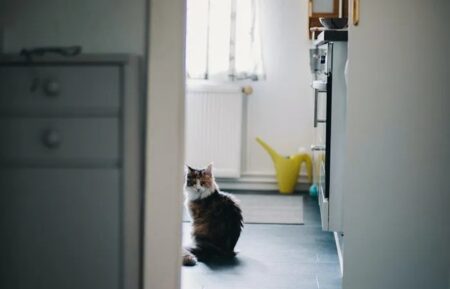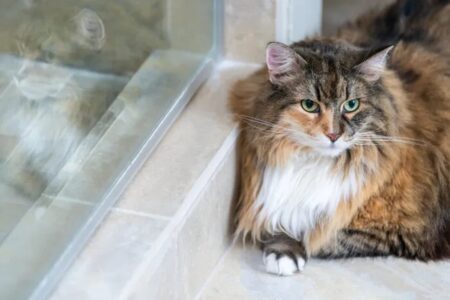
Why Does My Cat Guard Me When I Pee?
As a pet owner, you may have experienced a common behavior in cats where they seem to guard or protect you while you use the bathroom, specifically when you are urinating. This puzzling behavior has left many cat owners wondering why their feline companion exhibits such protective behavior in such an intimate moment. In this article, we will explore the possible reasons behind this behavior and delve into the unique nature of cats that may shed light on their instinctual actions. Whether you find it cute or annoying, understanding why your cat guards you when you pee can help strengthen the bond between you and your furry companion.
Why Does My Cat Guard Me When I Pee?
- Sense of Security
- Territory Marking
- Bonding Behavior
- Curiosity
- Separation Anxiety
- Protective Instinct
- Attachment to Routine
- Attention-Seeking Behavior
- Insecurity
- Litter Box Etiquette
- Sense of Security: Cats are natural predators and are always on the lookout for potential threats. When you are in a vulnerable position like peeing, your cat may feel the need to protect you and keep you safe.
- Territory Marking: Cats are territorial animals and they mark their territory in various ways, including guarding it. Your cat may see your bathroom as a safe and private space and want to claim it as their own by guarding it.
- Bonding Behavior: Guarding behavior can also be a sign of closeness and bonding between you and your cat. Your cat may see you as their companion and want to keep you close even when you’re using the bathroom.
- Curiosity: Cats are naturally curious creatures and they want to be involved in everything their human does. Your cat may be curious about what you’re doing in the bathroom and want to keep an eye on you.
- Separation Anxiety: Some cats can develop separation anxiety and may feel distressed when they are away from their owners. Your cat may guard you when you pee because they don’t want to be separated from you, even for a short time.
- Protective Instinct: Cats have a strong protective instinct towards their owners, especially if they see you as their primary caregiver. Your cat may feel the need to guard you when you are in a vulnerable position to keep you safe from any potential danger.
- Attachment to Routine: Cats are creatures of habit and they like to follow routines. If peeing is a part of your daily routine and your cat is used to being with you during this time, they may continue to guard you out of habit.
- Attention-Seeking Behavior: Cats are known for their attention-seeking behavior and they can become very clingy at times. Your cat may guard you when you pee because they want your attention and love, and see this as an opportunity to get it.
- Insecurity: Some cats can be incredibly insecure, especially if they have had a traumatic past. Your cat may guard you when you pee because they feel anxious and want to make sure you are safe and not going to leave them.
- Litter Box Etiquette: Cats are very clean animals and may want to supervise you while you are peeing to make sure you are following proper litter box etiquette. Your cat may see you as their “parent” and want to make sure you are doing things the right way.
Why Does My Cat Guard Me When I Shower?
Your cat may be guarding you while you shower for a few different reasons. For one, cats are curious creatures and may simply be interested in what you’re doing. Additionally, cats are very sensitive to changes in their environment, and the noise and water of the shower may be triggering their instinct to protect you. Finally, some cats may view the bathroom as a safe space where they can feel secure and comfortable, and your presence may provide them with a sense of security. Whatever the reason, likely, your cat is simply trying to look out for you in its unique way.
SEE ALSO: Lion VS Pitbull: Who Would Win In A Fight
Why Does My Cat Guard My Bedroom Door?
Cats often see their owners’ bedrooms as a safe space, and they may guard the door to help protect you while you’re sleeping. Additionally, cats are territorial creatures and may see your bedroom as part of their territory that they need to protect. They may also be guarding the door because they enjoy your company and want to be near you. If your cat is guarding your bedroom door, try to reassure them that you’re safe and that they don’t need to worry. You can also try to make your cat feel more secure by providing them with their own bed or cat tree in your bedroom.
Signs Your Cat is Protecting You
It is often said that cats are solitary and independent animals, but contrary to this belief, cats can be incredibly protective of their humans. As natural caregivers, cats are known for their ability to sense danger and act protectively towards their loved ones. Here are some signs that your cat is protecting you:
- Staying Close to You: Cats are known for their aloof and independent nature, but when they feel the need to protect their humans, they will often stick close by. They may follow you around the house, sit next to you on the couch, or even sleep next to you at night. This is their way of keeping an eye on you and making sure you are safe.
- Vocalizing: Cats are known to be relatively quiet animals, but when they sense danger, they may become more vocal than usual. They may meow, hiss, growl, or even yowl to alert you of any potential threat or to simply let you know that they are there for you.
- Alert and Focused: If your cat is constantly on the lookout or seems more alert and focused than usual, it could be a sign that they are protecting you. They may constantly scan their surroundings, pricking their ears, and swishing their tails, ready to react to any potential danger.
- Puffed-up Tail and Fur: When a cat feels threatened, they often puff themselves up by arching their back, raising their fur, and puffing out their tail to make themselves look bigger and more intimidating. If your cat does this when they sense a potential threat, they are trying to protect you by deterring any potential danger.
- Hiding and Observing: Cats are known for their exceptional hiding skills, and they may use this to their advantage when they sense danger. They may hide somewhere in the room while keeping an eye on you and the potential threat. This allows them to both protect you and assess the situation without putting themselves in harm’s way.
- Rubbing Against You: Cats have scent glands located around their face and body, and they use this to mark their territory and claim ownership over their surroundings. If your cat rubs against you, they are essentially marking you as their own and letting other potential threats know that you are under their care and protection.
- Protective of Your Possessions: Cats can form strong bonds with their humans and may view your possessions, such as your bed or favorite chair, as an extension of you. If they become particularly possessive or defensive over these items, it could be a sign that they are trying to protect them and, by extension, you.
Why is My Cat so Protective of Me?
There are a few possible explanations for why your cat may be so protective of you. First, cats are social animals that form strong bonds with their owners. They may view you as their family and may feel the need to protect you from potential threats. Additionally, your cat may simply be showing affection and letting you know that they care about you. If your cat is being particularly protective, it’s possible that they may be feeling anxious or stressed, and are trying to seek comfort by staying close to you. Whatever the reason, it’s clear that your cat feels a strong connection to you.
SEE ALSO: Can I Give My Dog His Antibiotic 2 Hours Early?
Should You Discourage Guarding Behavior?
In general, it’s not advisable to discourage your cat’s guarding behavior. It’s natural for cats to want to protect their territory and the people they care about, and trying to change this behavior may cause them to feel stressed or anxious. Instead, try to focus on creating a safe and secure environment for your cat, where they feel comfortable and don’t feel the need to guard. You can do this by providing them with plenty of food, water, and toys, as well as access to areas where they can feel safe and secure, such as a cat tree or a cozy bed.
How Can You Discourage Guarding Behavior?
- Encouraging socialization: One of the main reasons why cats exhibit guarding behavior is due to a lack of socialization. It is important to introduce cats to different people and animals early on in their lives to help them feel comfortable and secure in various situations. This will decrease the chances of them becoming possessive and territorial.
- Provide enough resources: Another reason why cats may guard their possessions is because they feel like they do not have enough resources to go around. This can be solved by providing multiple feeding and water stations, litter boxes, and toys for your cat. This will eliminate any competition over resources and reduce the need for guarding behavior.
- Train positive reinforcement: Cats respond well to positive reinforcement training methods. By rewarding good behavior with treats or praise, you can encourage them to be more relaxed and less possessive. This approach will help them associate good behavior with positive outcomes.
- Avoid punishment: Punishing a cat for guarding behavior is not an effective way to discourage it. Punishment can increase anxiety, fear, and aggression in cats, which can make their guarding behavior worse. It is important to use positive training techniques instead of punishment to discourage guarding behavior.
- Teach drop it/command release: It is crucial to teach your cat the command “drop it” or “release” when they have something they are guarding. This will help them understand that they need to give up their possession and that it is not a cause for aggression or possessiveness.
- Play with your cat: Cats that are not stimulated enough can develop guarding behavior as a means of entertaining themselves. Engaging in daily play sessions with your cat can help fulfill their need for mental and physical stimulation and decrease the chances of them developing guarding behavior.
- Desensitization training: If your cat is exhibiting guarding behavior towards a certain person or object, you can try desensitization training. This involves gradually exposing your cat to the trigger in a controlled and positive environment. This will help them become more comfortable and less possessive over time.
- Seek professional help: If your cat’s guarding behavior is severe or causing harm, it is important to seek help from a professional animal behaviorist. They can assess the situation and provide specific training and behavior modification techniques tailored to your cat’s specific needs.
- Neutering/spaying: Unneutered and unspayed cats are more likely to exhibit guarding behavior, especially towards other animals. Getting your cat spayed or neutered can help reduce the hormone levels that contribute to aggressive and possessive behavior.
- Be a role model: Cats often learn by observing their owners. It is important to model calm and non-possessive behavior around your cat. Avoid being possessive over your own possessions and show your cat that sharing and giving up possessions are normal behaviors. This will help your cat understand that there is no need for guarding.
FAQs
Q. How do you tell if your cat is protective of you?
A. Several signs may indicate that your cat is being protective of you. For example, your cat may follow you around the house, especially when you’re in unfamiliar territory. They may also seem more vocal than usual, meowing or purring to let you know they’re there. Additionally, your cat may rub against you or headbutt you, which is a sign of affection and bonding. Another indicator is if your cat suddenly starts acting differently around strangers, such as hissing or growling. If you notice any of these signs, your cat is likely feeling protective of you.
Q, Why Does Your Cat Guard You When You Sleep?
A. A common reason why cats guard their owners while they sleep is because they view it as their duty to protect their family and territory. In the wild, cats are vulnerable while they sleep, so they rely on their pack to keep watch and alert them of any danger. Your cat may see you as part of their pack, and view it as their responsibility to protect you while you sleep.
Q. Would a Cat Defend Its Owner?
A. In most cases, cats would defend their owners if they felt threatened or in danger. While cats are not typically aggressive animals, they can become defensive when they feel that their territory or family is being threatened. If a cat feels that its owner is in danger, it may hiss, growl, or even attack the perceived threat.
Conclusion
In conclusion, there are a few reasons why your cat may exhibit guarding behavior when you are using the bathroom. These can include an instinct to protect their territory and their human companions, a desire for attention or reassurance, or even a learned behavior if they have received positive reinforcement in the past. Ultimately, it is important to provide your cat with a safe and secure environment to alleviate any feelings of fear or insecurity that may contribute to this behavior. Consulting with a veterinarian or animal behaviorist can also help to address and modify this behavior if it becomes excessive or problematic.

